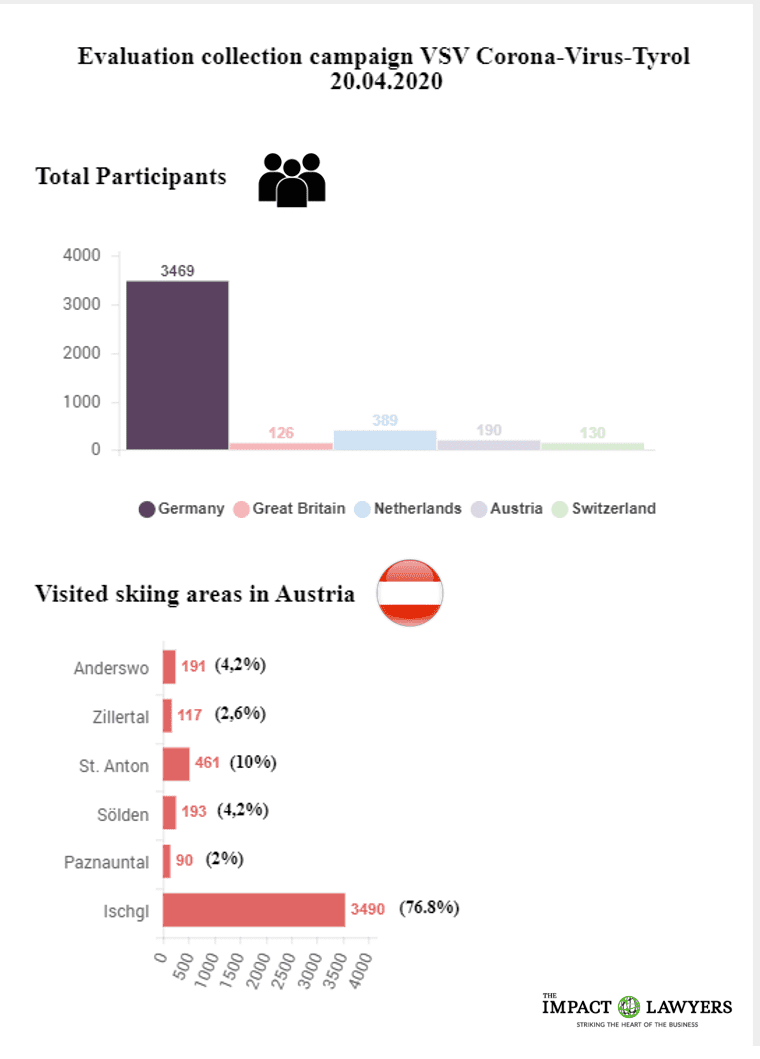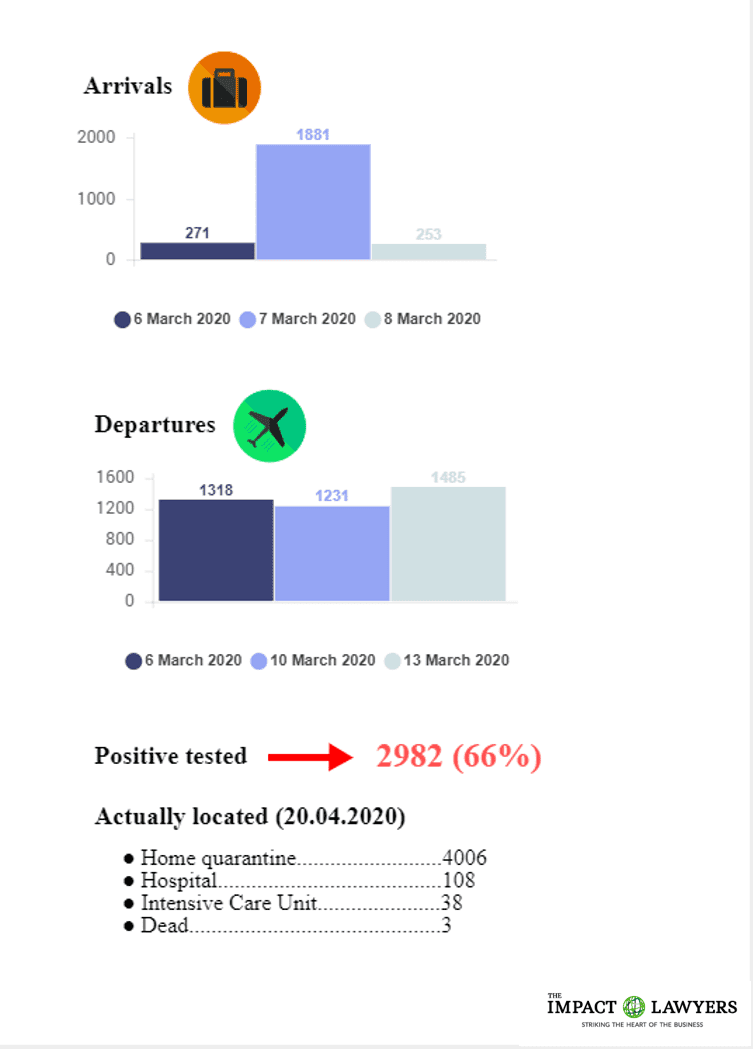Interview with the Austrian Lawyer who filed a Lawsuit against the State of Tyrol, one of the European Hotspots of the Coronavirus Pandemic
The following interview was held by Christine Fuessel, editor of The Impact Lawyers Magazine, with Peter Kolba, founder and president of the “Verbraucherschutzverein” (an independent consumer’s protection agency that is aiming to offer consumers protection and advice).
The Austrian lawyer, who is also known as an author and politician, has filed a class action against the authorities in Tyrol – this Austrian state recently gained a lot of attention from the international media because of the extensive outbreak and spread of coronavirus cases that happened in the last two months in the state´s world-famous skiing areas such as Ischgl, the “Ibiza of the Alps”. Thousands of tourists from a great variety of different countries are likely to have been infected with the novel coronavirus during their annual winter holidays.
Within this interview, Peter Kolba talks about the foundations and proceedings of the class action mentioned above.
In order to give our readers an idea of what your class action is about, my first question is: Who did you sue and why?
The first step of our class action against the authorities in Tyrol was that we made an exposition of the facts – a report of the claim – to the prosecutor of Innsbruck, in which we reported about what we have read in the media and what two bloggers had written (note: about the issue of the coronavirus infections in Tyrol) until this time. This report was submitted on the 24th of March. The aim of it is that the prosecutors should research the responsibility of local authorities – for example, of the “Landeshauptmann” (governor of the state) Platter, and also of his federal state government for health and sanitary services; also, the mayors of Ischgl and Sölden; and furthermore, we have also mentioned the tourist industry, especially the corporation of the ski lifts, in our claim to the prosecutor.
The second step was an online questionnaire on our website (www.verbraucherschutzverein.at) that we created on the same day. Until now, we have over 5000 answers from victims – from tourists who were on holidays in Tyrol (mostly in Ischgl) at the beginning of March, and came back home infected with the coronavirus. We suggest that they should take part in the procedure of the prosecutor – in Austria we call it “Privatbeteiligtenanschluss” (note: that means joining a law suit as a private party). There are no risks or costs involved, but you can make an inspection of records, and you can also make requests, and it stops the period of limitation. The aim of this is that the prosecutor sees how many people are involved, which gives him a bit more pressure to do his work well.
The other step or aim is to claim damages for the victims. This is a civil procedure. We examine if it is possible to sue the state because of the neglect or the delay of local authorities in warning tourists before the virus, and a delay in closing hotels, bars and the valley for skiers.
What is the foundation of your lawsuit?
The basis of the lawsuit is the neglect of the authorities to inform the people of the coronavirus outbreak in Tyrol and to close the establishments in the affected area on time. There are some incidences that are hard to explain, like for example the fact that on the 25th of February, an employee of a hotel in Innsbruck (Hotel Europe) came back after her holidays in Italy, and she had symptoms of the coronavirus, and was tested positive. She came from the Lombardy. On that day, the local authorities called the police, the police was marching on and the hotel was quarantined until all the workers were tested, their tests resulted negative. Some days later, maybe one and a half weeks after the first incidence, there was a similar situation in Ischgl. A barkeeper was tested positive for coronavirus, but in this case, the authorities did not close the bar immediately, instead they only gave the advice that the rooms should be disinfected and the staff of the bar should be changed. In an official statement they said that they do not believe that it is very likely that there has been an infection from person to person. There can be no other reason for doing this other than the interests of the tourism industry – that is why in this case they did not undergo the same procedure as they did days before in Innsbruck.
At the end of the same week, at the 13th of March, the Chancellor Kurz said in a press conference at 2 PM that the valley of Paznaun should be closed on the same day. So of course all the tourists tried to get out of the valley, and this was the next big mistake of the authorities, because a lot of them were already infected without their knowing. Nevertheless, they were allowed to go home to their countries, where they infected other people. That is why Ischgl was one important hotspot in Europe for the infection of people with the coronavirus, spreading it from there all over Europe. But not only people from Europe were infected in Tyrol, we also have 28 complaints from people from other nations, like the United States, Israel, Singapore… So you see, it´s not only Europeans who are affected. But the biggest number of complaints comes from Germany, with 3500 complaints so far. And, until now, we have also been informed that eleven persons who got infected there died from the coronavirus. Around 50 people are still in intensive care in the hospital, and it is unsure if all of them will survive, or if some of them will die.
Regarding the proceeding of the lawsuit, what are the next steps you are going to take?
We are now very busy because we are in the process of getting power of attorney from the 5000 affected travellers – so far, we already have it from 500 persons – and we will then make the connection to the prosecutor procedure for them. This will be our work for the next week, I think… Because if I write one email, three more emails follow (laughs). So, to sum up, it is a lot of work. And, on the other hand, we are doing some research in Tyrol ourselves to find effects for the civil procedure, so we can claim damages by the state.
Don´t you think that due to the fact that this pandemic is an exceptional unprecedented international situation, there could be an exemption from liability of the government, as they did not have knowledge of the true consequences the coronavirus could generate?
No, I don´t think so, because for example, as they were informed about a possible coronavirus outbreak in Innsbruck on the 25th of February, the government did know what to do. Nevertheless, one week later, they failed to do the same in Ischgl because of the economic interests of the tourism industry. So I don´t think that it is a valid argument that they didn´t know what to do in face of the coronavirus outbreak in Tyrol.
Which do you think might be the trump card for winning this case?
I think that we have enough examples that, on the one side, state that the policy of information was public and that it was wrong, and I don´t know what they (note: the authorities) might possibly say against that. Because until now, they say that the infection rate from person to person in Tyrol is not so great, and this is obviously wrong. And we are researching now if there was knowledge about the virus in Tyrol maybe earlier, at the beginning of February, or even in January. Because on the 26th of January, they made an order on the basis of the “Epidemiegesetz” (Epidemics Law) – a very old law, nobody knows it – but it is a law for such a situation as we have now, and the authorities made an order that the novel coronavirus is an illness which should be reported to them immediately, if anybody knows about a case. Therefore, we will research who has made mistakes in the beginning of February – so, a month before they actually put Ischgl under quarantine.
Let me please also say some more words about the civil procedure, I have forgotten before. Nearly half of the 5000 victims say or believe that they have law insurance. For this people, it would be possible to organize individual court cases. But for the other fifty per cent, who have no law insurance, the idea is to organize a class action “Austrian style” – this is a class action that we have founded twenty years ago. It´s not to compare with the American class actions, but it is possible to do it in Austria, if we sue in Austria. If we want to sue outside of Austria, it´s not possible, but within the country it is. In order to do so, the victims have to transfer their claims of damages to one person – for example, a consumer organization – and this person makes one action against (in this case) the state. And one more thing, we will have the lawsuit in Vienna, and not in Tyrol. This is very important, as we have concerns that in Tyrol there might not be a fair procedure.
What do you think will be the estimated amount for monetary compensation?
Five million euros would be the smallest amount, I think. This differs a lot from case to case – eighty per cent of the claimants are persons who came home from their holidays from Tyrol with a coronavirus infection, and then had to stay in home quarantine. If you are a worker and still get your money, there will be no big damage. But, we do also have other cases in which the infected people are entrepreneurs who had to shut down their firms, and therefore have a lack of revenue due to the infection.
On the other hand, people who have painful symptoms can get a compensation for personal suffering. This depends on how many days they were in pain, and how strong the pain suffered was. And, if somebody dies, there are grief damages that the families can claim. In the case of decease, it is also necessary to check if there are any dependent family members – for example, three families in Germany lost their father and husband, who died with 54 or 57 years, being the one in the family who earned the money. So this is another possible damage. And, it is also possible that the compensation for personal suffering of the person that died is transmitted to the surviving family members.
So the compensation will be different from case to case, but I think it will be much more than five million euros – but we will see how many people in the end will be willing to take part in the lawsuit.
Related links
Main menu








